THE GIVER Stars Jeff Bridges, Meryl Streep & Cast Interview
- Details
- Category: Interviews
- Created: Thursday, 14 August 2014 02:15
- Published: Thursday, 14 August 2014 12:09
- Written by Lupe R Haas
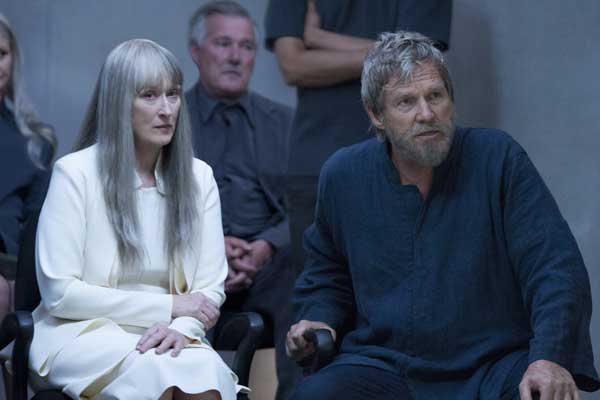
Phillip Noyce's star-studded adaptation of THE GIVER is a science fiction adventure worth embarking on. Set in 2048 AD, it centers on a so-called Utopian society that enforces uniform feelings and actions. The visually stunning futuristic tale features turns from Jeff Bridges, Meryl Streep, Katie Holmes, Taylor Swift, and emerging young talents Brenton Thwaites and Odeya Rush.
At the New York press day for the film, held at the J.W. Marriott, the cast, director and writers spoke about their love of the book, collaborating with such an eclectic pool of talent and shooting on location in South Africa. But first, Jeff Bridges took the time to acknowledge the passing of his “Fisher King” co-star Robin Williams.
Jeff Bridges: I just want to acknowledge the fullness of life, the joy and the sadness that is in store for us all and I’m filled with both of them today, as I was last night, learning of my dear friend’s passing, Robin. The wonderful, joyous feeling of giving birth to our child here, THE GIVER, and the combination is just quite remarkable. It reminded me of what THE GIVER and The Receiver might’ve felt, holding all those memories. It was an amazing night. I remember pulling up to the boathouse where we had our party and I’m sitting there with my wife, trying to gather myself, and I look out the window and I say, “Is that Robin? Is that his ghost? No, it’s Radio Man!” And it brought back all of these wonderful feelings of what an amazing time together here in New York, shooting The Fisher King. And I got out of the car, embraced the Radio Man and looked in his face, and I remember when we were shooting Fisher King, Radio Man remembers where all the movies were shot. I don’t know how he magically does it. But I remember seeing Radio Man, and we could not believe that Robin’s character was there in the flesh, in reality. And there he was. And so we embraced Radio Man, I felt Robin’s spirit as I’m feeling him now in this room with us. Just before I came down, I’m looking out my window to Central Park, my favorite part about New York, and I’m remembering the last scene of me and Robin, out there at four o’clock in the morning, nude, naked. And Robin was just wild and free, he says, “Let the wild pony dance!” And he’s rubbing his butt on the grass like this, saying, “You know why dogs do this? Because they can!” He was just so wild. I just had to share that with you, because that’s what’s going on so strongly, and how much I miss him, I’m sure you guys do too. What a gift he was to all of us, and what a gift Lois gave us with her wonderful book, and Phillip down there, putting it up on the screen. So that’s all I wanted to say, let the wild rumpus start.
[Applause]
Q: Ms. Lowry, this all begins with you. Twenty years ago, this book came out. I can’t imagine you necessarily thought this day would come. When did it enter your mind that a film might be [on the horizon], and is it something you always welcomed with open arms?
Lois Lowry: As you said, it was 20 years ago, but it was two years after that that Nikki and Jeff came to me. That’s a lie, they didn’t come to me personally, their people to suggest that we turn it into a movie, as if it would be easy at the time, but maybe good things never come easy. So it was a very long haul. Eighteen years after that day, finally the movie’s on the screen. Most of the people who are here with us today would not have been a part of it eighteen years ago, so good things come to those who wait.
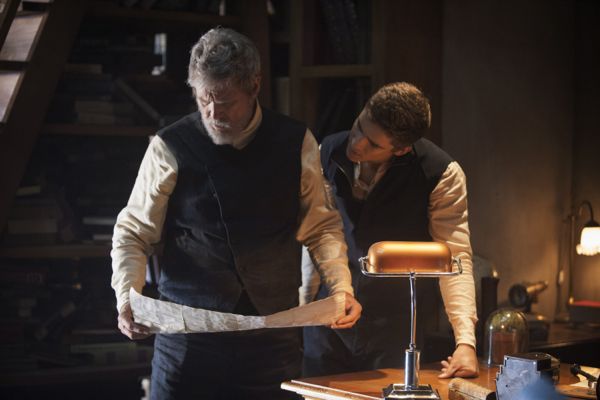
Q: Jeff, you act as producer, your association, as Lois said, goes way back. It’s a very personal connection for you too. Tell us about why this resonated with you on a personal level, and a bit of the history of that.
JB: It goes back eighteen years, and I wanted to direct my father in something, and I wanted it to be something that my kids could see. They were all young, they’re all in their thirties now. So I got a catalogue of children’s books, and I’m looking at the different covers, and I see this photograph of an old, grizzled guy. And I thought, my dad could play that part. I noticed the Newbery Award stamp on there. I said, “Oh, this might be good!” I read it, and of course it knocks me out, it’s a kids’ book, but as an adult I just loved the story and the themes in it. I’m very excited about it, and I bring it in to tell my wife about it, and the kids said, “Oh, we know that book. We’re taught that book in school.” I said, “What are you talking about?” They say, “Yeah, there’s a lesson plan for it.” I said, “You’re kidding me!” My excitement grows, and then I find out it’s also on the list of banned books, and I then get more excited. A little danger. I said, “Oh, this is gonna be a cinch to get made. Over 10 million copies in 21 countries, the money guys are gonna go crazy over this.” That did not prove to be true. The controversy of it being one of the banned books, and selling so many copies and being popular in school, it freaked them out. And also, when we finally got the script together, it was very challenging to put this world that Lois had created in the book up on the screen, because so much of it was in your dialogue that this guy was having with himself, Jonas. Bob Weide, on the end of the table, he was our first writer. We spent a week or so up at my place, jammin’ on the story. It was challenging, but we dug it. We took it around and the guys, the financiers, they were too shocked. And so it took this long. I’m really so pleased it did take this long, because this is the right team. We got the right director. Casting is everything. Not only the actors, but the crew and certainly our director and our director of photography, Ross Emery, was so got. Phillip Noyce was like the key to the cast that we scored. If it was made earlier, Odeya wasn’t born. We would not have had Odeya with us and the whole team wouldn’t have been there. So I’m glad the gestation period was that long. Here we are.
LL: I’m just glad it didn’t take any longer, because I’m 77 years old!
Q: I do wanna talk about the cast you’ve assembled here today. But I want to talk about the writing. As you mentioned, Bob wrote the original screenplay way back when. Was it a challenging thing to crack in the initial going? There’s obviously fertile ground there for a screenwriter, but what were there challenges at that point?
Bob Weide: It was challenging. People have asked me if I felt the pressure of how loved the book is, and all those readers it has, and of course at the time I wrote it, my drafts, it was only a couple years old and it didn’t have a following, it had won a Newbery Award. But I loved the book and a book is not a movie, changes had to be made and things had to be added and revised, but all that was done with the notion of being true to the spirit of the book. Lois and I were in touch during that time, we had phone calls and I would run things by her, and she’s very non-territorial and not precious about her words. And I’d suggest what we needed to change and said it all sounds good. And as Jeff said, a lot of the book is sort of internalized and Jonas’s thoughts and reactions to what’s going on, and how do you put it up on the screen? The other big challenge is, without giving anything away, is in the book, once Jonas flees the community, the book stay with him on his journey, and then goes back to the community to see how his exodus has affected the people in the community. You got to see how his leaving affects the community, that basically meant creating storylines. It all felt quite organic to me, and years later it was honed and perfected by Michael. One thing about our two scripts, our drafts, is that they’re seventeen years apart. And Michael and I hadn’t met until last week. By the way, I suggested everybody should collaborate. That’s the way to do it, because no arguing, no firing. When I read Michael’s finished script, it really felt like a true collaboration, as though we had sat down side-by-side and wrote it out together. I read his changes and I felt it was very challenging, but we took a shot at it.
Q: The book to film is gorgeous, and I want to explore the decision to portray some bits...much of it is black and white, it’s a big one for any studio film. Is that something that you all collaborated on together, was there any discussion of going the other way?
Phillip Noyce: No, no. We just wanted Jonas’s and everyone’s limited perception, and Jonas’s gathering perception of color, and structured the color scheme around that. Of course, you don’t have to see black and white when you’re reading Lois’s book, but you can imagine you’re watching the events in color. But we had to make some pretty hard decisions and we laid out the film from first frame to last and then shot it that way, and that’s how you see it in the cinema.
Q: To our young actors here today, did any of you know this book prior to coming to the material?
Brenton Thwaites: Sadly, no.
Odeya Rush: None of us? Did any of us read it?
BT: Yeah.
OR: Oh yeah, at school!
Q: What struck you about it?
OR: When I read the book, it was one of those things that really changed my perspective on a lot of things. I think when I read it, I was in probably fifth grade, and I didn’t do a lot of thinking about the distant future, as far as our society goes, you know, at that point in my life. The really kind of switched that up for me, and it really kind of blew my mind in a way that stuck with me, and when I got this script, I just immediately thought, I’m gonna say yes to this. I really hope it’s a good adaptation, I think it’s a good portrayal. Because if it is anything like the effect the book had on me, then I’m gonna do this.
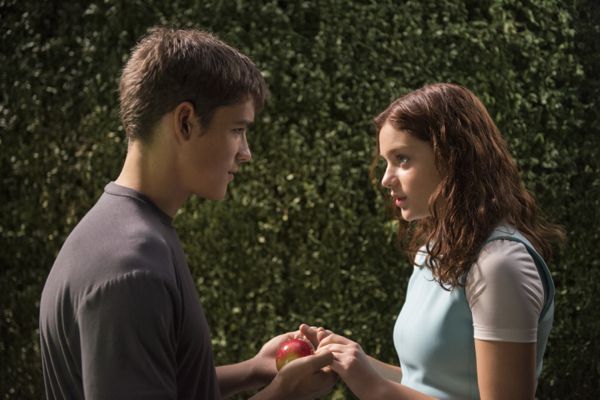
Q: For Ms. Streep, this is new material. This is a different part from what we’ve ever seen you portray, which obviously I guess is the goal of any actor. What [struck you] when the script came in, when this material came your way, which said I need to do this. This makes sense for me right now?
Meryl Streep: Well, I like to be boss, so… [Laughs] So that was a good thing. I always wanted to work with this gentleman [Jeff Bridges] my entire career, never got the chance somehow. He eluded me. So that was a big, big part of it. Also, I’m a big admirer of Phillip’s films, I think he’s pure, pure filmmaker with great taste, I knew, to bring this to life. Especially the colorless parts of it, it would take a great artist, it’s really magical.
JB: Did your kids read the book?
MS: Yep. Mine did, yeah. They were required...they had a list of required reading over the summer and it’s always [a pain] to get them to do it. [Gestures] That’s one of my parenting methods. [Laughs] But that one was put in front of them and they devoured it, the two younger ones.
Q: I have a question for you, Ms. Streep, and it’s about the fact that when an actor makes a movie, it’s all about the emotions and it’s all about that intensity of emotions. Here, your character is deprived of them. so how do you build something which you deliver still with that constriction because of who the character is?
MS: I love the way you say my name. It’s an interesting thing to play people who have suppressed emotion, but I felt that the chief elder didn’t take her medication as well on certain days. Do you know what I mean? [Laughs] Like we all skip, probably. Because clearly, she had some deep history with THE GIVER, the receiver of wisdom, right? And I think that that was something that intrigued me about this script. But in terms of...I think that’s sort of the point of the book. You can’t keep things in, you know, you can’t suppress the things that make us human. It’s pointless to try.
Q: This is for Katie Holmes. Did your daughter watch the movie, did you discuss it with her? And what do you want her to learn from it?
Katie Holmes: Thank you for asking. She’s a little young but very excited to be a part of this, and I think that so many people who have read the book are gonna be so happy with this adaptation.
Q: A follow-up just in terms of the character… I mean, usually if a character doesn’t have a name, one would think that’s a limiting characteristic. You are literally a mother in the film. What’s the challenge of portraying a full-bodied character that is, as the journalists earlier mentioned, muted, is not able to express herself in the ways that all of us express ourselves day-to-day? Can you talk a little about the challenges of this character for you?
KH: Well, it was challenging and Phillip was reminding us not to touch each other, which I find to be something you just do naturally as a mother and as a human being. That was one of the things. But I just approached it as a mother whose child is leaving the nest. That’s what kind of made the character real to me. It was interesting to play someone who has no emotion, yeah.
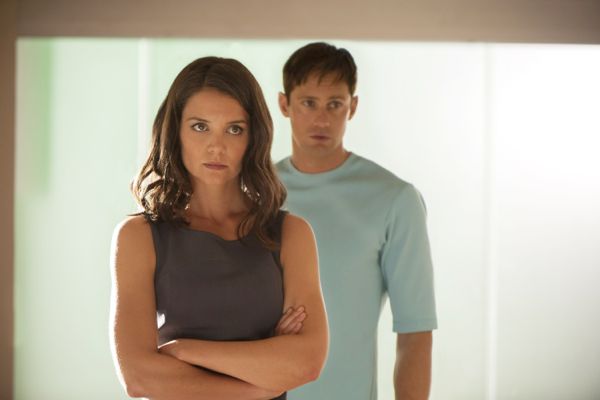
Q: For Brenton, Odeya, and Cameron… Within the first ten minutes of the film, you have a tall task, in that a lot of the rest of the film rides on what you establish in this very core relationship and the journey that you all go on and the fracturing of that relationship as the film progresses. I know you guys shot this in South Africa, did that sort of lend itself to helping establish a bond that you could
OR: I think when you are on location and not everybody has their family there, they do come visit, you do become a family. We had a Thanksgiving together on the beach and we got together on weekends and just being with the movie crew and being with the local South Africans, everybody just becomes really close. Aside from Brenton, everyone’s really easy to get along with, so…
Q: Response, Brenton? Or are you just gonna let that go?
BT: I’ve got nothin’, bro! I’ve got nothin’. I’ve used ‘em all up! I’ve got none left!
Q: Except for the last minute, when the film ends, we find the world is finally gonna find love, music, et cetera. At the last minute, the lead character finds religion, specifically Christianity. Is that sort of the message of the film? Because that’s the last image we have in our heads.
PN: Do you think he finds Christianity exclusively?
Q: The last song we hear is a Christmas carol…
PN: But Christmas is not only celebrated by Christians, and Christmas carols are not only sung at that time of year by Christians. So I don’t think he’s...I don’t think it was anyone’s intention that he could be discovering Christianity, but rather that he should be discovering home, a concept of home. I mean, in the book, there’s a memory where he experiences Christmas and celebration. I don’t think when you read the book you’d think that he’s become a Christian. That’s certainly not the intention of the movie.
LL: I’ve discovered over the years that many people have given the book as a bar mitzvah gift. [Laughs] Well, they see it as a rite of passage, the boy taking on the responsibility of manhood. Of course, in the book he’s twelve. In the movie, he’s older so it wouldn’t be bar mitzvah kind of situation. But I don’t...certainly I never intended it to be a Christian allegory, though some people read it that way.
Q: The idea that knowledge is power is such a prevalent idea in this film. For each of you, was there something that when you were around Jonas’s age that you learned that really affected you and kind of helped you throughout your respective careers?
Cameron Monaghan: I learned how to ride a bicycle, but it turns out that might not have been the case… We had these death traps that were built for this movie, these heavy steel...I got my shoelace caught in the chain once, I fell into a bush. I think we have a bunch of outtakes of me being completely incapable and uncoordinated. I wish I would’ve properly learned that lesson.
BT: Emma, how was the bike for you?
Emma Tremblay: Hard. I needed somebody to teach me how to ride the bicycle because they’re like, heavy and it’s hard. It’s not like the bicycles we use!
PN: They were prop bicycles, meaning we made them cheaply! Meaning they fell apart and they were very heavy.
Nikki Silver: It was the South African version of the futuristic bicycle.
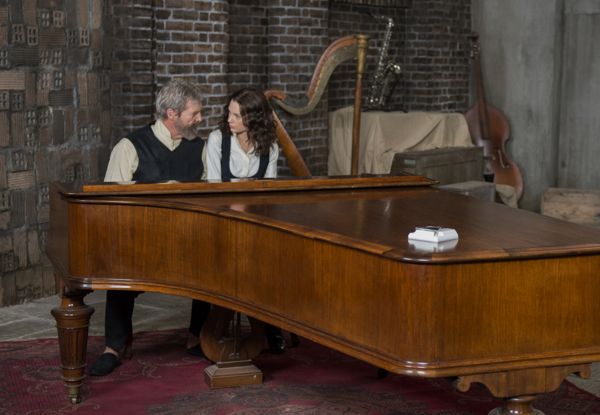
Q: I was wondering, in such an emotional role, how Katie and Meryl and Jeff could mention what you did as a group or personally to decompress a little bit.
JB: We jammed. We did a lot of music. Lots. Taylor as well. Right, Taylor?
Taylor Swift: Yeah.
JB: My scenes with Taylor were mostly at the piano, so we were talking music all the time and between scenes, we’d break out our [guitars] and pick a little bit. We had great jam sessions with Brenton and Odeya, and Michael Mitnick plays a bad piano.
OR: Michael! That was crazy. He’s so good!
JB: Isn’t he? Yeah, wonderful. So that’s what we did.
Michael Mitnick: Best night of my life!
Q: Question for you Taylor, I mean obviously, a lot of attention [for you] given that this is a significant step for you in the acting world. I’m sure you’ve had some opportunities, some offers have come your way. What were you looking for? And what about this one made it the right time and the right project?
TS: Like Meryl, it’s unbelievable to even think about having the opportunity to work with Jeff, so I think for me that was just an unbelievable concept that I would get to do this dream scenario where I get to have a very small role that has a pivotal part in the story, but isn’t jumping into too deep water your first time in a serious, dramatic movie. I think that the fact that it was all those things put together, the fact that it was a story that stuck with me from my childhood, the fact that it was written by an author I really respect, the fact that it celebrates all the things that I hold really dear, the things that are most important to me, like our history and our music and our art and our intellect and our memories, I think that that really had a great deal to do with why I wanted to be a part of this. I think it...in a world where right now I’m seeing so many of my fans and these people write to me on Instagram and Twitter and letters, saying that they’re having such a tough time with life because they can’t imagine that we can experience such great pain, such intense loss, such insecurity. And the thing that i just wish I could tell them over and over again is that we live for these fleeting moments of happiness. Happiness is not a constant, it’s something that we only experience a glimpse of every once in a while, but it’s worth it. And I think that’s what they’ll take away from this movie.
Q: I guess this is for Phillip and Lois, but also Jeff, Katie, and anyone else. Did you guys ever have a conversation about the science fiction implications of this film? In other words, maybe the backstory that led to this culture, the post-apocalyptic scenario, was there any conversation? Could you describe some of those conversations, or at least maybe a summarization by some of you guys?
NS: We had a lot of discussion about whether...what the future was. We talked to Lois a lot about it, and I think what was important to all of us is that the world was headed in a very bad place. And whether that was ecological, whether it was world war, it’s unimportant, actually, to the story. What’s important to the story is that we went on a very, very bad path. So we’ve tried a lot of things. Phillip experimented with a lot of ideas, and we left that to what we think are very smart audiences, to try to figure out and have their own interpretation of how we got here.
JB: As Nikki was speaking, I was trying to remember what my scenario was, and I think it went along with Nikki about something terrible happened, or our darker side kind of surfaced, and we put a stop to that by trying to perfect ourselves. This is an example of one of the things we try to get convenient. How wonderful, we have these water bottles. We can drink these whenever we can. What a lousy idea, to have have these. They say they’re biodegradable often, but they’re not. They end up in the ocean, the fish eat ‘em, we eat the fish. It’s that immediate gratification that’s a part of being human beings. We tend to kind of go that way. That’s a part of who we are. One of the things I like about this movie and the book as well is that it’s not really shoving a message down the audience’s throat, but it hopefully is provoking them to ask some questions. What are we willing to do for our comfort and our safety, and what is the true cost of that as a human being?
Q: This question is for Jeff. I wanted to ask you, of course, it took you so long to bring up this movie, but technically and visually, the movie’s pretty beautiful. Tell me about that process. Visually, technically, the special effects, how did you guys work this out?
JB: Well, that’s really a question for Phillip, but before I hand that off to Phillip, there’s a guy sitting behind you that I want to stand up and be recognized. Neil Koenigsberg, please stand Neil. He’s been my partner for eighteen years, my partner along with Nikki, getting this film made. I just wanted to acknowledge him. Phillip, why don’t you take that one?
PN: Well, that’s a long story. Lois had conceived a certain type of community, which was based on her experiences growing up in military bases all around the world, and one of the places that she lived in was in Tokyo just after the second World War, where she, like Jonas, would leave the walls of the base and venture out into the madness that was postwar Tokyo. Another story she told us was growing up on Governor’s Island, surrounded by water. When you read the novel, you can see those two influences. I went for holiday in Cape Town, South Africa, and took a shot of my son on top of Table Mountain, and when I was coming home in the plane, I looked at it, and I looked into his eyes as he looked out into those clouds, and I thought, wow, that could be Jonas dreaming about going to the benevolent version of Elsewhere. And that became one of the ideas that we explored, which combined two of Lois’s ideas, or experiences, which were combined to produce this community, one of several communities on top of a mesa, and surrounded by a cloud bank that was a barrier to the outside. Going to shoot the film in South Africa was a big decision because it meant that the quality of light, the vegetation and everything were just a little different than most of the rest of the world, down there in south South Africa, right at the bottom, down at the Cape. So, the world looks a little different. It looks a little familiar, but there’s something weird about it. The color schemes, as I’ve said, were inspired by Lois’s wonderfully visual writing, and Ed Verreaux was our production designer, and we sort of had a bake-off as to how those houses would look, starting with the military style, houses of the 50s that Lois had imagined, and going right through to mid-21st century housing, egalitarian housing as it might be built. We sort of ended up with about twelve different designs, passed them around, including to our writer, she chose the same one as the rest of us, and that ended up being the architectural style. I could go on and on about the look of the film. A lot of it, of course, is CG. A lot of the buildings are not built when we actually filmed, but were built much later, designed by Ed Verreaux, and then built by our CG team. All in the name of sameness, and all in the name of creating a supposedly egalitarian world, free of conflict. So design came from Lois’s ideas, both written and ideas that she told us, that she shared with us. I hope that answers the question.
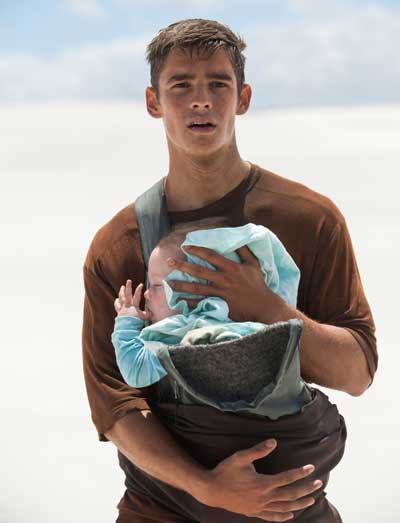 Q: Because you’ve been working on this project so long, I wondered if your original version of how the film would be has evolved over time, or if it stayed pretty true to your original vision.
Q: Because you’ve been working on this project so long, I wondered if your original version of how the film would be has evolved over time, or if it stayed pretty true to your original vision.
JB: I came to a pretty interesting crossroads on my adventure with this movie. As I’ve said before, I was gonna direct my father, Lloyd, in the movie. So I had spent these eighteen years going through many, many versions of the script, working with many directors, trying to realize the vision that I had. Just generally, my vision was very close with the book. The book moved me in a profound way, and I really wanted to do the book justice, I was very concerned about that. When Harvey Weinstein and Walden Media said, “We’ll make this movie, but here’s how we wanna make it,” I said, “That’s kinda different than I imagined it.” So I kinda thought about that, and I figured I got a decision here to make, and I can either say, “Bon voyage, guys, I wish you the best of luck, I’m not gonna be joining you, but make a good movie,” or I could say...you know, this is something I do often in my life, when I get to this spot. How will I feel when I let this go? How will I feel if I engage? I pictured myself letting it go and feeling really terrible. And then I thought, well, I can engage. Usually it’s kind of an experiment on myself to practice letting go of control, and almost use it as kind of a spiritual exercise, getting involved. I knew that Harvey was...he’s an old-school movie maker. Look at the movies that come out of Harvey’s oven. Also Walden. So I figured I’m gonna jump in here and just surf this wave here and see what happens. And then the casting started happening, met with Phillip and these guys. That was the big bump for me. In the book, they’re twelve and for various reasons, they wanted to...some of the team wanted to make the kids older. That was really a struggle for me, to let that one go. Then I met these two, and that started to relax. And then Brenton made a great statement. In the book, it’s the ceremony of twelve. And he said, “Well, it could be the ceremony of the twelfth grade,” where kids are seventeen or eighteen. I remember going through that period with my three girls, and that was the age when they were questioning, “What are we gonna be when we grow up?” So that kind of worked. So it was a constant process of letting go. Another spiritual question that popped up for me while I was working on it was, okay, you’re gonna let go, Jeff. But when do you yin and when do you yang? You know? I’m mainly a yinner. I just kinda go, surf, let it go. I came up with an interesting answer to that question. When do you yin, when do you yang? You just take out that ‘when do you,’ then it becomes, ‘you yin and you yang.’ And I noticed, I’m yinnin,’ but every once in a while, right Phillip? But it’s rare, I would yang, but it would just kinda come out, and that’s how I shared the project. I didn’t wanna suppress that yang, but generally, I wanted to roll and take all of these different changes and different conceptions in line and let them be almost aspects of my larger self, you know? I don’t know if that answers your question, but thank you.
Q: This is for Michael, in the back. Listening to Robert and Lois talk about the foundation that they put together years ago and you coming in on the project something like seventeen years after the fact, what were specifically some of the things you brought to the table as a writer of the drafts?
MM: I first encountered the book in the classroom, in Mrs. Braumberg’s fifth grade English class in Pittsburgh, Pennsylvania, and the book stayed with me. I guess your question is what I did. What I tried to do was be invisible and hopefully be a successful extension of Lois’s voice. There are added beats into the movie, things that are extrapolations of waves that run throughout the book, but what I tried my best to do, and I know everyone did, was to both honor the book and try to make a good movie.
NS: Michael always undersells things, but what he does...Michael really came in with a vision, and to make this really a movie for all audiences and a really big vision. Jeff talked about how we started out with this vision of just the book, and Michael really took it and created the film that we see today. I think contemporary, but also just the funny, the action, bringing it all together, and being able to take the spirit of Lois’s book and create a thoughtful summer blockbuster, which is incredible.
Q: My question is for Meryl. I was curious, between this movie and Into the Woods and Ricki and the Flash, it seems to me at least that you’re kind of picking roles that you can have the most fun in, in a way. Because you seem to having a lot of fun in these roles, and I was curious if that was a purposeful choice by you.
MS: As opposed to punishing myself in the rest of my career! [Laughs] I certainly am having fun with the things that I’ve been offered. I’m so fortunate and I haven’t quite figured that out, but you don’t wanna look in the horse’s mouth. Gift horse, yeah. Thank you. I knew there was some kind of analogy there. But yeah, I’m really happy to have been included in this amazing group, and in the next things. God knows how they’ll turn out, but I have hope.